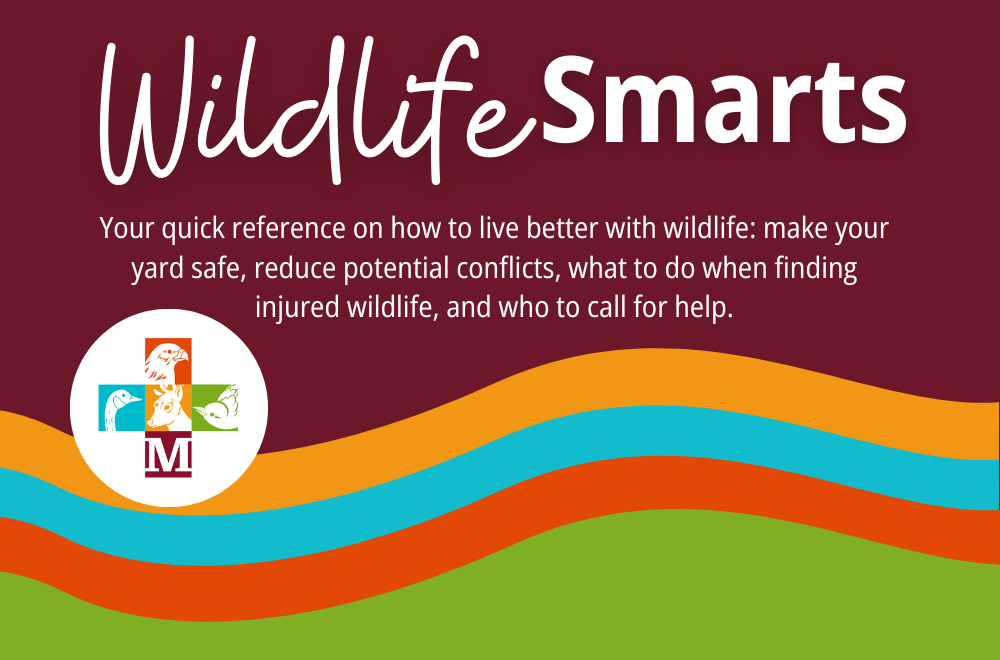Have you ever wondered who to call in a wildlife emergency? Maybe you'd like to make your yard safer for wildlife while still avoiding attracting some species. What would you do if you found a baby wild animal or found yourself in a tricky situation?
Our Wildlife Smarts campaing can help to answer your questions and guide you to the support you may need. Find all the information below and dowload our handout here for saving in a convenient location when you need it most.
Who to Call
Injured or orphaned wildlife + general advice
Wildlife conflict (bats, skunks, pigeons, mice, coyote, fox...)
Medicine River Wildlife Centre - 403-728-3467
Deer or moose unable to get up
Dangerous wildlife (cougar or bear)
Report-a-Poacher - 1-800-642-3800
Ask for the officer on call in your area and explain the situation
Animal found dead on the road
Your local community, Alberta Highways, or Alberta Animal Services (in Red Deer)
Safe Yards
Removing hazards and making your yard a safe place for wildlife will reduce their injuries and your stress.
- Keep urban and rural cats indoors or under control
- Rural dogs should be kept close in June (during fawn season)
- Cover rain barrels
- Remove outdoor sticky fly traps
- Remove outdoor fine netting
- Cover open containers of oil
- Install screen covers on window wells and dryer and stove vents
- Prevent window collisions by installing deterrents (www.flap.org & www.featherfriendly.com)
- Safely recycle plastic lids and can holders to avoid entanglement
Avoid Attracting Unwanted Wildlife
If you don’t want wildlife in your yard, don’t invite them!
- Feed pets indoors
- Enclose compost
- Clean up ripened fruit
- Properly enclose sheds, walkways, and porches (contact MRWC for proper methods)
- Keep garbage in sheds or secure containers
If You Care, Leave Them There
There are many cases when a young or even injured wild animal should be left alone. It’s important to know when to intervene and when to stand down.
Adult deer or moose who can walk but have a damaged leg
Leave alone - If the animal is eating and moving, they have a good chance of survival if left. These huge mammals are surprisingly fragile and die very easily once brought into care.
Fawns in a curled up position
Leave alone - Young deer are regularly left by their mothers for hours at a time. This is normal. Please do not disturb the fawn.
Fawns walking and noisy
Get help - This could be a sign that something has happened to the mother. Call MRWC for advice.
Songbirds unable to fly but healthy looking (May - August)
Leave alone but monitor - This is likely a fledgling and is learning to fly. Parents are nearby to protect and guide.
Baby hare alone
Leave alone - The little bunnies are born fully haired and are left by their mothers most of the time, only meeting up at dusk and dawn to be fed. They don’t need our help if they are in a safe place. If out in the open, quickly place in the best, nearby cover. Do not take them home as they die very easily in captivity.
Tricky Situations
Please call MRWC for advice before taking action on the following situations:
Ducklings without a mother
Never chase them as the stress can kill them. If possible, slowly gather them and put into a box with a warmed towel. Never put water in with them.
Injured eagle or large bird of prey
These birds have strong feet and sharp talons. Have a towel or blanket, appropriate sized box, and gloves ready.
Problem skunks
Do not trap and remove skunks that may be causing a problem. Studies show that this method can actually increase the local population as new males will move into the territory and females will have larger litters. You may also leave young without a mother. Eviction and prevention techniques are the best long term solutions. Read more and get help here.



